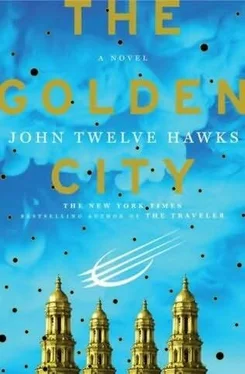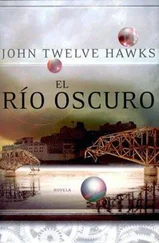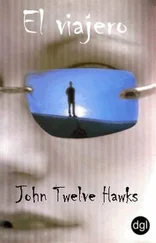A steam whistle blew with a high-pitched shriek and the crawler began to roll forward. Startled by this disturbance, one of the finners broke the surface of the water. The old woman grabbed its tail and flipped it onto the conveyer belt, where a man sliced off its head and another man tossed its body onto the back of the frame. The crawler kept shaking as if were about to fall apart. Michael stared at the eel head with its needle teeth as it floated past him.
“Tolmo!” Verga shouted. “What’s your task now? Where’s your blade?”
Michael drew his knife and caught up with the others. Both the men and women worked quickly. They gauged the size of the unseen spark with their feet and legs, then reached into the water, grabbed a stem and pulled the plant to the surface. One or two quick cuts and the spark was free. Then they had to catch up with the crawler and toss their harvest onto the conveyer belt.
Michael could feel the spark hidden below the surface, but it was difficult cutting them free. Their stems were thick and tangled. Everything was a mess of leaves and mud and his own confusion. Bend down. Grab. Cut. No, that’s not right. Too small. Toss it away. Finally, he cut a plant of the right size and realized that the crawler was now thirty feet away from him. He had to run through the muddy water, splashing and swearing to himself until he dumped the spark onto the belt.
Verga smiled. “Good. That’s an offering for the gods.”
“So how long do we have to do this?”
“’Til the midway resting.”
“And when is that?”
“The crawler stops and turns when it reaches a boundary mark. You’ll have time to fill your lungs…”
The crawler blew its whistle and Michael had to run again to catch up with the machine. Back in his own world, he and Gabriel had worked in a cattle feed lot, and one hot summer they had mopped tar onto roofs. But this didn’t feel like a job at all. It was a muddy battle with the living world-grabbing the spark, slashing its stem and flinging it away as if it was the head of dead enemy.
The hazy triangle of suns moved higher in the sky and one of the smaller machines left with its load of spark. Still squeaking and blowing off steam, the main crawler stopped beside a levee, and the harvesters stepped onto dry land. Near this resting point, someone had set up a large cone of hammered copper filled with clean water. Cups were attached to the cone with little chains. While the harvesters took turns with the cups, a young woman opened a sack and passed out small loaves of something that looked like bread. Michael took a loaf and bit off a piece of the end. The midday meal had a brownish-orange color and a coarse texture; it tasted like roasted hazelnuts.
Verga sat near the edge of the levee gobbling down one loaf with two other loaves on his lap. “It’s the gunder-spark today. Thought they’d serve us the rasten-spark, but this is better.”
“Is that all you eat?”
“I forgot-you guardians eat more of the world. We servants eat finners and shantu and rake, but mostly it’s spark, cooked different ways.”
“You ever want to eat like the guardians?”
“Here I am and here I should be,” Verga said as if this one phrase could refute any argument. “We servants are the hands and arms and legs, standing strong on the ground. And the militants are here…” He touched his heart. “And you guardians are here…” He touched his head. “All is just when each does his part.”
When the harvest resumed a short time later, Michael felt stronger and was able to keep up with the others. What had looked like a haphazard operation turned out to be an efficient system of farming. There was no need to plant seeds or pull weeds as long as the mother plants were left alone. Drainage pipes connected the different fields, and a weak current kept the water from turning stagnant. Even the clanking, hissing wet crawler followed an established pattern; the servant operating the machine steered a straight line by aiming at the sticks embedded in the mud.
Toward the end of the day, the workers put away their knives, rolled down their boot-tops, and followed Verga through the grid of levees to the dry land that surrounded the waterfields. After twenty minutes of walking, they reached three railroad tracks set on a gravel bed. The tired workers lay down on a weedy strip beside the tracks until a steam engine arrived, pulling a line of flatcars. The steam engine itself was as simple as a teapot on a three-wheeled wagon: a steam cylinder and a single piston transmitted power to the crank shaft that propelled the train.
If the train carried him to a new area, he might find it difficult to return to the passageway. As the harvesters began to climb onto to the flatcars, Michael looked around for landmarks and saw a rusty handcart that resembled an old-fashioned rickshaw. At night, he could follow the railroad tracks back to this point and then retrace his steps to the sticks he left in the water.
His new friends waved their hands and called to him. “Hurry up, Tolmo! We’re leaving!”
Michael jumped onto one of the flatcars, and the rickety train started down the tracks. They followed the perimeter of the water-fields, stopping every ten minutes or so to pick up another group of harvesters. Although the flatcars were moving about as fast as a Sunday jogger, there was a lively, excited feeling in the group. Everyone knew each other and people shouted jokes back and forth about the amount of spark each group had harvested that day. The wheels clicked with a quick rhythm as the wind of their passage ruffled the women’s hair and the hems of their skirts.
Michael sat at one end of the flatcar with his hat pulled low over his face. He thought again about the summer he and Gabriel worked at the cattle feedlot. They didn’t have money for gasoline so, at the end of the work day, an older man named Leon would give them a ride home in the back of his pickup truck. It was just like this: rolling down a road past the countryside.
Forget all that, Michael told himself. Focus on the present situation. Listening to the conversations around him, he figured out the system of two-syllable names used by the servants. Verga was also called “Verga sire-Toshan”-which meant he was the father of the man named Toshan sitting a few yards away. Mothers added their oldest daughter’s name, and so the woman next to him was called “Molva san-Pali.”
In the distance, huge white shapes seemed to emerge from the ground. As the train grew closer, Michael saw that they were approaching a cluster of triangular buildings with steep roofs. The steam engine blew its whistle loudly, the engineer pulled back a brake lever, and the entire train screeched to a stop. Everyone jumped off the train, and Michael followed Verga across the tracks. A line of rail cars had been left on a side track; some of them held wire hoppers filled with harvested spark. A few cars carried stacks of bricks and a work crew was unloading them into wheelbarrows.
A pathway led them to a central courtyard surrounded by the triangular buildings. The courtyard was dominated by white brick structures that were as large as the barns back in South Dakota. Near a machine shop, men were repairing a vehicle that Verga called a “dry crawler.” It looked like a nineteenth century stagecoach with a driver’s box and a steam engine in front. But there were also three-wheeled carts pulled by shaggy ponies with blunt noses and hand carts pulled by the older children. An open cooking area was at one end of the courtyard; women scooped out the pale orange pulp of the spark plant and molded it into loaves which they baked in an outdoor oven.
“Stay with my boots,” Verga said, and Michael followed the old man through the crowd to one of the barns. He found himself in a cavernous room where sunlight streamed in through high windows. The building was used as a dormitory for all the men in the community. There was a mound of straw at the center, pegs for hanging blankets and clothes, and a trough for waste that was continually flushed out by the water flowing from the bathing area. Imitating the old man, Michael washed his face and hands beneath a stone spout.
Читать дальше












